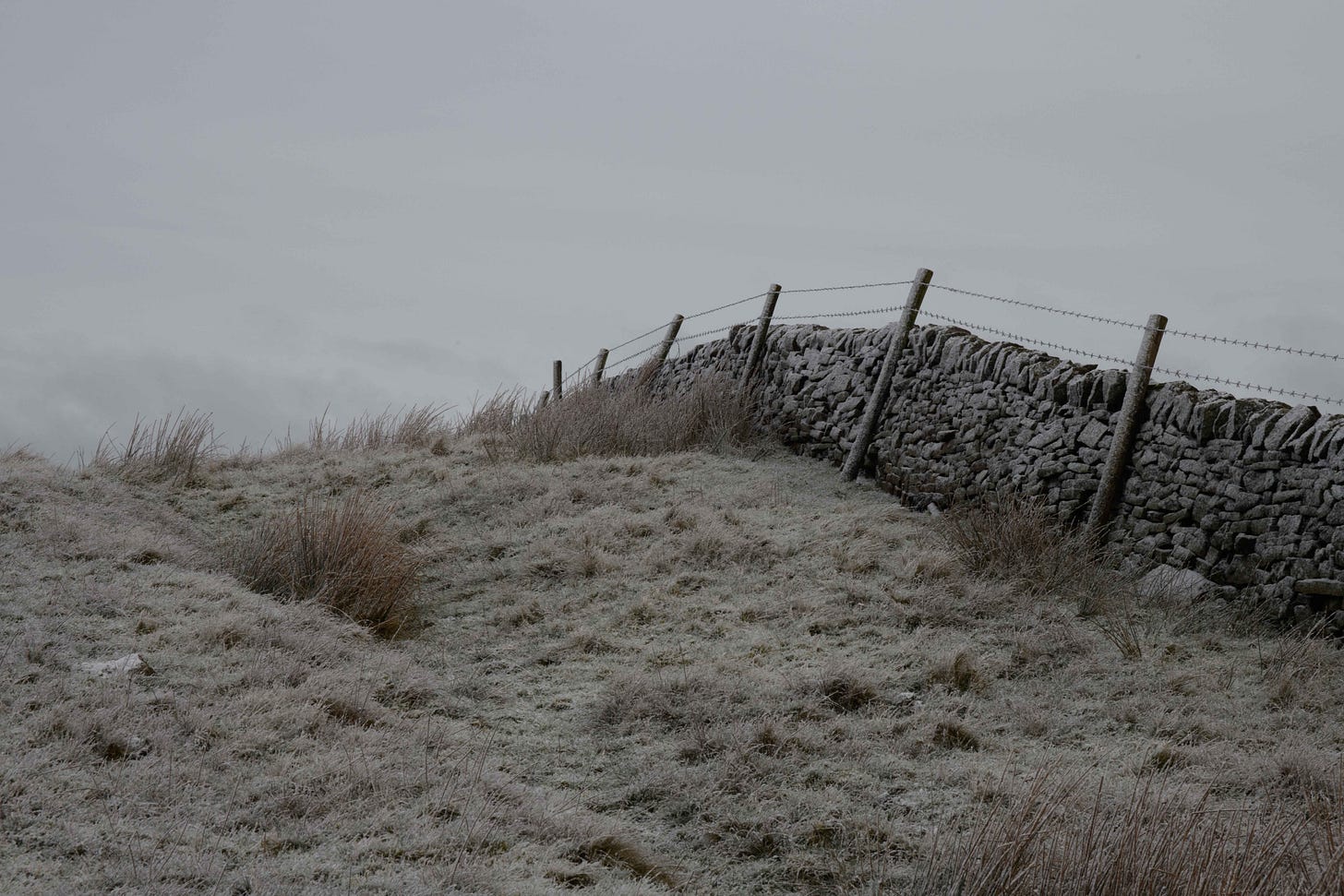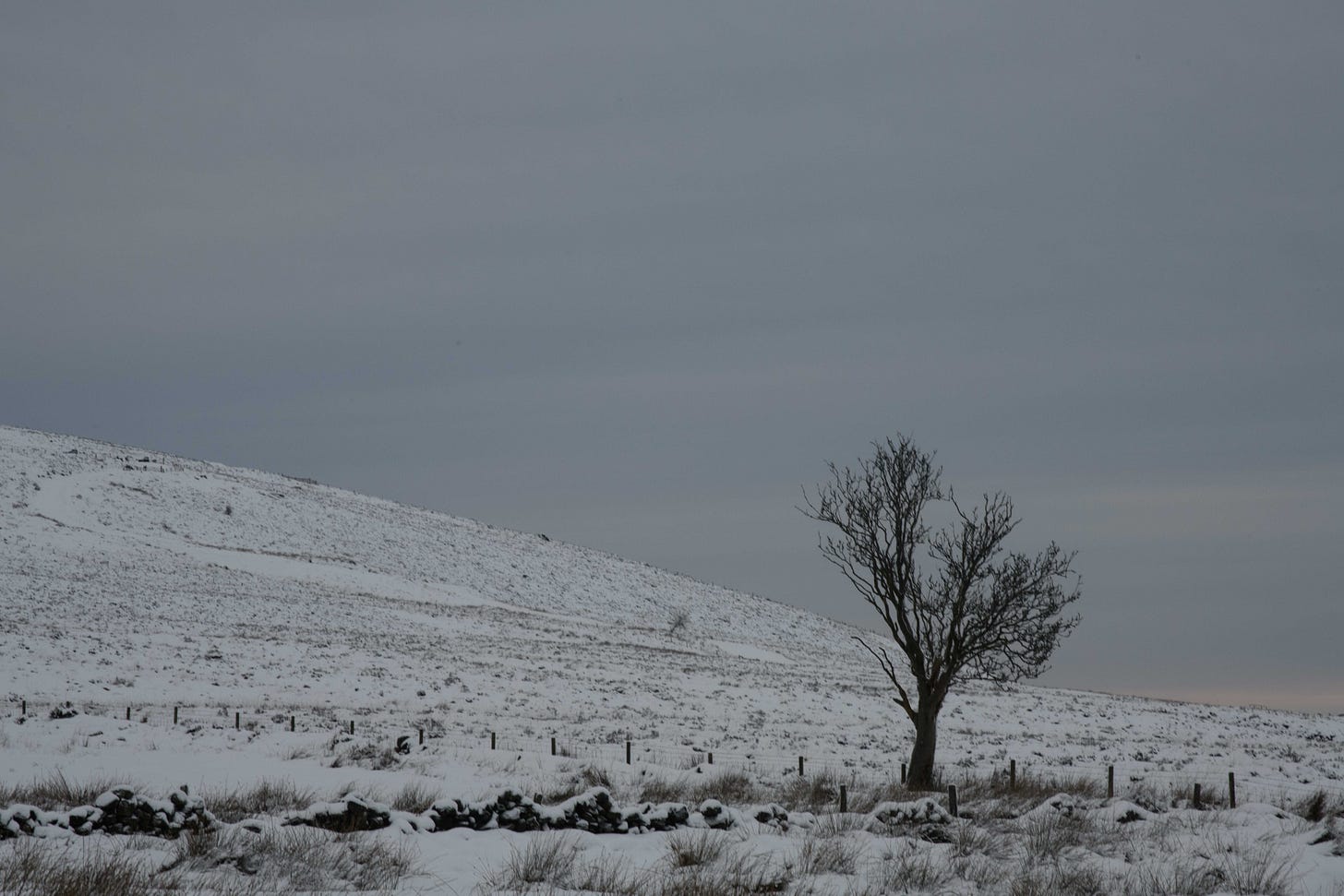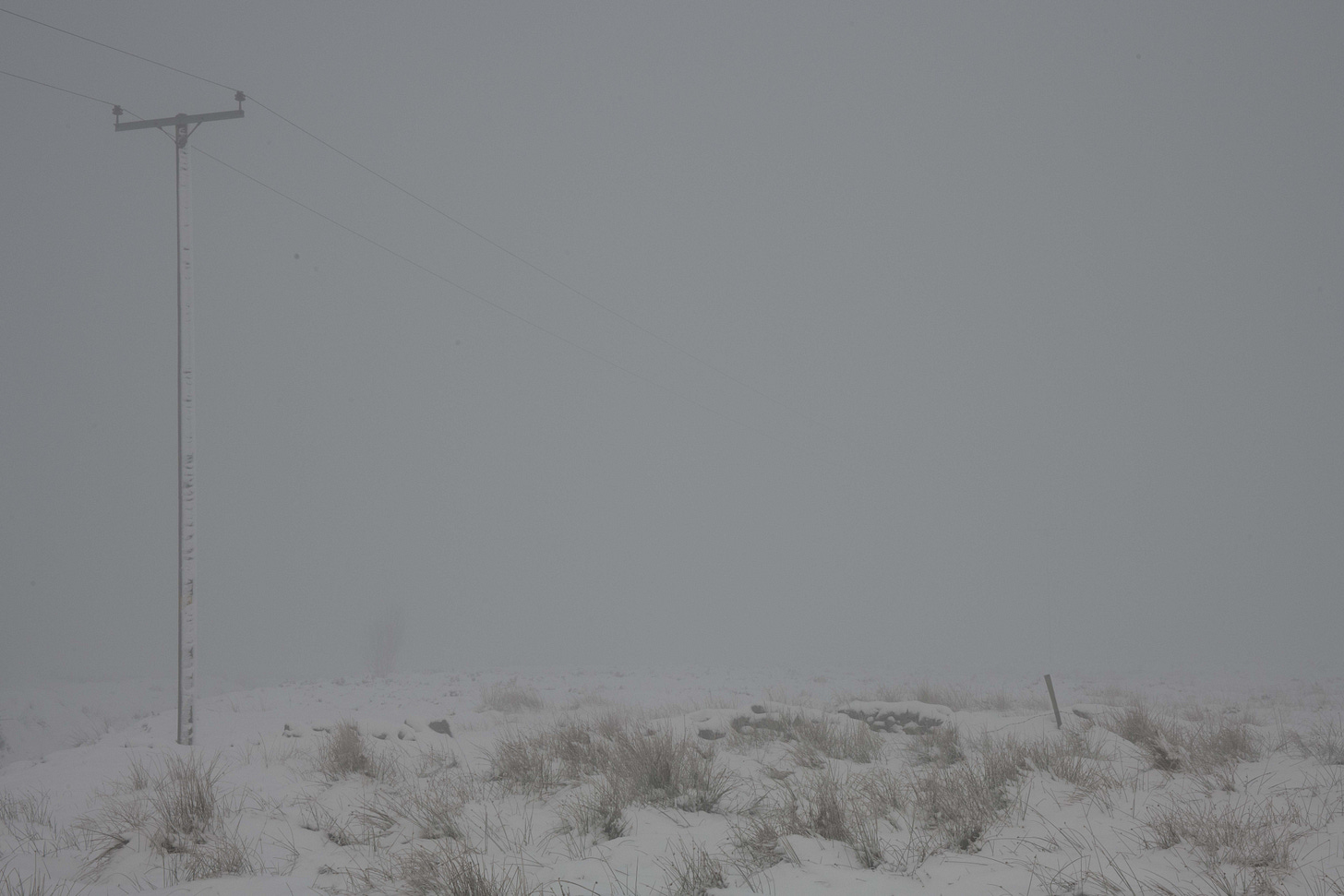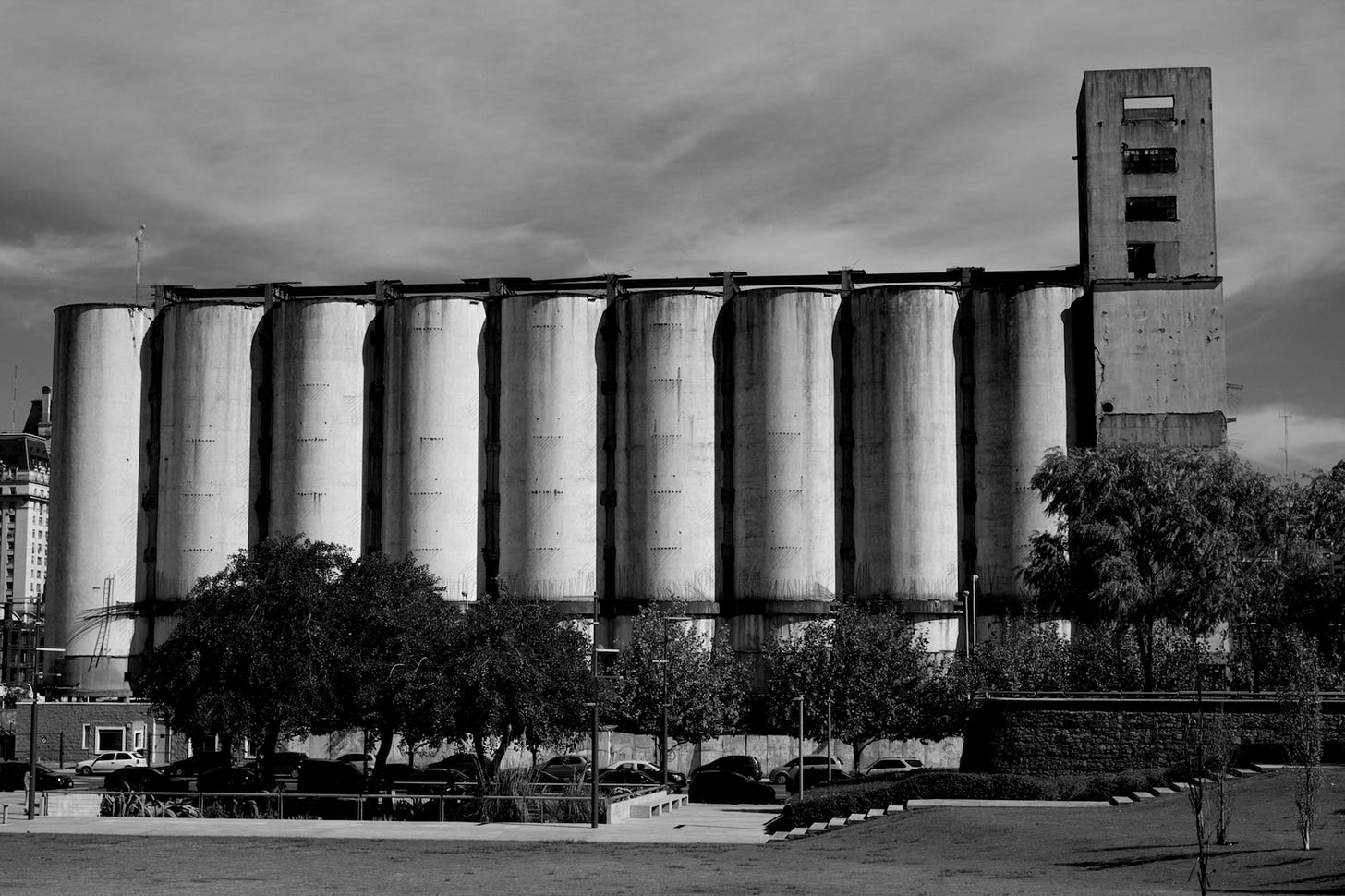So here we are again, with January all but behind us already. A belated happy new year to you all. I’m tempted to say that time seems to fly by faster than ever, but I like what David Whyte said about it recently, namely that time doesn’t pass us by - time isn’t short - rather we pass through time. And what interesting times we are passing through right now.
With that in mind, this week’s offering is an entangled mess of bits and pieces. A plate of antipasti if you like, rather than a primo and a secondo. Let’s tuck in.
Discovery
I was on silent retreat in the second week of January. The Peak District was spectacular, blanketed in snow for 7 days, minus 11ºC, and quite unlike any landscape I’ve experienced before. Sometimes things are just meant to be. Snow is a recurring metaphor in Zen for ‘shunyata’ – emptiness or boundlessness. Here in deep snow, shunyata is not an absence of anything so much as endless spaciousness.
Bleached out ginger clumps
Denizens of winter life
Respite in turmoil
In the silence different things, novel things, are revealed. Things get noticed, not figured out necessarily, simply noticed. This noticing what we notice is itself a transformative act. With all the senses tuned in, the curiosity radar is calibrated. Questions arise such as:
“What is here that I can’t see, what am I overlooking? Is there something being missed because I’m afraid or complacent?”
This curiosity is a philosophy of becoming humble. Stepping into the wilderness of zazen hour after hour is to not take everything so personally. Two things become crystal clear - we’re all in this together, and not knowing is most intimate.
Diamond white snow melt
Dripping from wizened fingers
Man and tree combine
Thoughts always come. Simon says if the thought hasn’t vanished, perhaps I’m not fully aware of it yet. When we lose things, we discover things. Like Michelangelo carving away the Carrara marble to reveal the angel within. Here there is no space for labelling, judging, blocking or avoiding. As thoughts arise, let them through, let them breathe and let them go. In awareness they vanish.
Do you have the patience to wait
till your mud settles and the water is clear?
Can you remain unmoving
till the right action arises by itself?
The Master doesn’t seek fulfillment.
Not seeking, not expecting,
she is present, and can welcome all things.
Excerpted from the Tao te Ching by Laozi,
(translation by Stephen Mitchell)
It’s sometimes said that zen practice is for breaking locks. How often are we not aware of the locks we need to break? Getting lost in the snow is no bad thing – a bit of honesty, a bit of motivation, a burst of energy, and we come out of being lost. The mind is bright, and a bright mind can be a calm mind. Beware the dull mind. Simon says let it all in, even the monstrous night-time stuff as well. There are locks to be broken. In the frozen snow there are signs.
Hare tracks, pristine snow
A frozen move unlocked
The perfect escape
Fragments
Rest in peace the inestimable David Lynch. What an unbridled force of creativity. In a beautiful interview he did for the BBC with Patti Smith in 2014, he said this:
“I get ideas in fragments. I always say it's as if in the other room there's a puzzle, all the pieces are together, but in my room, they just flip one piece at a time into me, and the first piece I get is just a fragment of the whole puzzle. But I fall in love with this fragment, and I love this fragment, and it holds a promise for more. And I keep it, I write it down, and then I say that having the fragment is more bait on the hook, and it pulls in more”
What a gorgeous way to think about the creative process. It’s such a lovely watch - two humble titans of art, just riffing. And then just before the finish Patti says:
“But I think, in the end, I have a feeling we think the same way, in that neither one of us likes labels - what is beautiful or what's ugly? I mean, we don't have any answers for these questions, because we don't want answers. Isn't that so?”
David says: ”We don't want to know”
Patti - “Yeah we don't want to know the answers. We don't need them. We just need to do our work.”
David “Exactly right Patti.”
Amen.
I’ve linked to the full interview below.
Entropy
Physics wasn’t my game at school. I was hopeless at it. I wish they’d taught us something of real practical value like thermodynamics. I’ve been thinking about the concept of entropy in the context of a lively discussion I had with the collaboration specialist and wannabe game park ranger, Tom Farrand last week. It followed a post I put on Linkedin about protecting development project value by thinking about the energy dynamics in teams. It seems to have resonated beyond real estate.
Entropy shows us that left unattended, systems naturally drift toward chaos. Energy is necessary to maintain structure. After all this time at the coal-face and in the boardroom, I can confidently say that organisations and project teams experience organisational entropy - a gradual decline into in-effectiveness, misalignment or irrelevance unless proactive measures are taken.
Processes grow outdated, hierarchies become entrenched, miscommunication increases over time. This is not necessarily the result of incompetence or negligence but simply a natural tendency of project teams or companies becoming bloated and complacent.
Here's the piece:
I’ve come to a stark conclusion. It runs counter to accepted wisdom in the real estate industry. Property development project failures are rarely down to a lack of technical or commercial acumen, a lack of design or construction skills, or insufficient project monitoring. They are rarely down to bad marketing or sales strategy, notwithstanding macroeconomic volatility.
The reality is projects fail because there is never enough attention paid at the beginning to the unique human dynamics that will be at play throughout the project. And what I’ve never seen done, on the funder side, is any kind of deep, qualitative review of the potential cohesiveness and subtle inter-team dynamics of the constituent parts of each development team. What I mean by that is I’ve never seen any formal, heavily weighted reliance placed on a considered understanding of the critical human characteristics that will make this specific team, in this specific context, succeed or fail.
How do I know this? Over the last 35 years I’ve been involved in delivering £900m of development projects at all levels in the project hierarchy from site labourer to development owner and everything in between. And having reflected on all of that, particularly over the last 6 months, I have concluded that every project that has been successful has had a strongly connected team with a clarity of purpose, a healthy and trusting culture, and a curiosity and open-mindedness to new ideas and perspectives. And every project that has been unsuccessful has lacked it. I’ve never seen it properly considered and weighted in decision-making.
Why does it happen? I think, fundamentally, it’s because of the crazy idea that we can only truly manage what we measure. The typical approach is to review what can be cleanly reported against - the problem is all the stuff that makes all the difference can’t be. How do you measure trust, connection, compassion, creativity, problem solving ability under uncertainty, feel, vibe?
And there’s something unique about development projects that makes them especially difficult. Every project is a de-facto start-up business but with a fundamental disadvantage. It has serious complexity beyond the norm and that is the psychological dynamics within the constituent parts of the development team itself.
The challenge here is that every player, first and foremost, has an identity, a loyalty, a connection, and a culture, that belongs outside the development team. Lawyers, financiers, planning consultants, architect, engineers, interior designers, landscape designers, marketing professionals, sales agents, main contractor, sub-contractors, quantity surveyors, project managers. All of these people have a sense of belonging (which the research shows is the pre-dominant factor in the success of teams) that lives outside the project team.
I’m working on some possible answers. In the meantime what do you think?
Layers
The Don of Italian architecture, Renzo Piano, has a lovely take on how there are essentially two approaches to architecture – the first where a developer builds from scratch, ignoring any pre-existing context, and the other where the developer works in considered partnership with what already exists. Places are made of layers and understanding layers is essential to creativity. Renzo says:
“By adding something else, you don't have to destroy what is already there. Some people believe that freedom, total freedom, is better than having obligation. And I think those people don't understand creativity.”
I was heavily influenced by this thinking when we planned the development of the derelict administration building at Cane Hill, choosing to retain the façade and as many of the layers that had been laid down since its original construction in 1882. I think it pays dividends to think in layers.
Stupidity
There’s no doubt that simple stupidity is often the cause of major problems. I think it often connects with people not having skin in the game.
I’ve just come across a fascinating paper, published in 1976 by University of California, Berkeley, Professor Carlo M. Cipolla. It’s called the Basic Laws of Human Stupidity and it doesn’t look like much has changed in the last 50 odd years. There’s a link below – here’s the summary. It’s worth a read.
Law 1: Always and inevitably, everyone underestimates the number of stupid individuals in circulation.
Law 2: The probability that a certain person be stupid is independent of any other characteristic of that person.
Law 3: (the Golden Law): A stupid person is a person who causes losses to another person or to a group of persons while himself deriving no gain and even possibly incurring losses.
(The Third Basic Law assumes, although it does not state it explicitly, that human beings fall into one of four basic categories: the helpless, the intelligent, the bandit and the stupid):
Image by Vince de Vries on Wikimedia, licensed under CC-BY-SA 4.0
Law 4: Non-stupid people always underestimate the damaging power of stupid individuals. In particular non-stupid people constantly forget that at all times and places and under any circumstances to deal and/or associate with stupid people always turns out to be a costly mistake.
Law 5: A stupid person is the most dangerous type of person.
The brilliant US economist and social philosopher Thomas Sowell said:
“In the long run, the greatest weapon of mass destruction is stupidity.”
Maybe he’s right. He also talks about trade-offs and I think this is connected. We just can’t have everything – in his words:
“There are no solutions to intractable problems only trade-offs.”
Throwing orange paint at priceless art is always stupid by the way Dale.
The Holocaust
Yesterday was Holocaust Memorial Day and this year is the 80th anniversary of the liberation of Auschwitz-Birkenau.
Helen Conway wrote an illuminating essay about emptiness yesterday and had this to say:
“I am writing this on Holocaust Memorial Day when any of us who have been to Auschwitz will recall the very present sense of absence of the thousands of political prisoners, Soviet POWs, Sinta, homosexuals, Jehovahs witnesses, Roma and Jews who were murdered or suffered there. The emptiness throws a searchlight on to our consciences and requires us to ask not whether the exact suffering is happening again but whether any egregious suffering in general is being repeated and if so what are we going to say about it?”
I’m sold on emptiness as including the ‘presence of absence.’ I wonder whether we might also think of it as the ‘absence of presence’ (I think I might be stealing this from the extremely brilliant Dr Iain McGilchrist). Anyway, emptiness is full of possibility. Emptiness of self allows for the presence of everything connected and whole.
Helen’s substack is full of beautiful, perceptive writing. Check it out here.
Yesterday was also a day to re-watch the heart warming moment in 1988 when the hero Sir Nicholas Winton was unveiled as the saviour of 664 Jewish kids. There’s a link below.
Ignorance
Carl Sagan wrote this in 1995:
"I have a foreboding of America in my children's or grandchildren's time - when the United States is a service and information economy; when nearly all of the manufacturing industries have slipped away to other countries; when awesome technological powers are in the hands of a very few, and no one representing the public interest can even grasp the issues; when the people have lost the ability to set their own agendas or knowledgeably question those in authority; with our critical faculties in decline, unable to distinguish between what feels good and what's true, we slide almost without noticing, back into superstition and darkness.
And when the dumbing down of America is most evident in the slow decay of substantive content in the enormously influential media, the 30-second sound bites now down to 10 seconds or less, lowest-common-denominator programming, credulous presentations on pseudoscience and superstition, but especially a kind of celebration of ignorance."
Carl Sagan, The Demon Haunted World: Science as a Candle in the Dark
How is it that some people are just made so smart that they can see around corners and shine a light on the future decades ahead of time?
Crazy
When everything seems crazy you can, of course, just walk. In London town, just off Picadilly Circus and with the God of love and sex hidden away behind hoardings, you might bump into Victor Ray and Teddy Swims
The Curiosity Dividend Podcast
I’m revitalising my podcast and the first episode (somewhat confusingly episode no.12) with the mighty Dr. James Taplin, came out to you last week. I’ll be bringing over the archive episodes shortly so keep an eye out for a link. Apologies for the more frequent emails in the short term as the episodes get uploaded.
Raw concrete
In celebration of the UK release of The Brutalist last Friday, the new film by Brady Corbet, starring Adrien Brody, nominated for 10 Oscars, there’s a download below of a piece I wrote on Brutalism for Ernest Journal some years ago.
There must be something concrete in the air - The Brambell Laboratory at Bangor University has just been Grade II-listed, and the Grade I listing for the university’s 1911 Main Arts Building has been expanded to include the ‘New Arts Wing’, which was added in 1963. I love the fire that brutalism brings. Let me know what you think.
Fire
Talking of fire, it’s difficult to see what happened in California over recent weeks without contemplating the negative impacts we have whenever we mess around with nature. Sticking things on tectonic plates and trying to muscle nature into man-made submission is always a recipe for drama. But perhaps California can learn from Seneca:
“A setback has often cleared the way for greater prosperity. Many things have fallen only to rise to more exalted heights. That opponent of affluence in the capital, Timagenes, used to declare that the one reason fires distressed him was the knowledge that what would rise up afterwards would be of a better standard than what had burned”
Letters to Lucilius no. XCI
Craftsmanship and creativity
I love Stewart Copeland. He’s fascinating, articulate, incredibly funny, and a spellbinding drummer. He’s a craftsman and a creative genius. He recently sat down with Rick Beato and talked about life in The Police. There’s a link to the interview below. It’s highly recommended.
I got into The Police through my older brother Aldo. When Message in a Bottle was released in October 1979, I was in my first month at senior school. Lonely times. Stingo spoke to me. I loved it then, and I love it now. We’re all lonely at times, perhaps the secret is to find a way to be alone and not be lonely:
Walked out this morning, don't believe what I saw
Hundred billion bottles washed up on the shore
Seems I'm not alone at being alone
Hundred billion castaways looking for a home
Here’s Stewart dissecting his drum work. It’s spellbinding. Whatever you do please watch through to 8 minutes 41 seconds and you’ll see not only what a terrific drummer he is, but also his wicked sense of humour.
Why I write
Because I agree with exactly what Arthur Miller said:
“Everything I write is both a confession and a struggle to understand things about myself and this world in which we live.”
Thank you for being here. I’ll be back with some more in a couple of weeks.
Please keep an eye out for a name change - Haxted Thinking will be retitled The Curiosity Dividend from the next edition onwards. I think this better reflects the eclectic nature of the content and what I’m hoping to do here. My deep rooted belief is that curiosity is a philosophy of being and the rewards of opening up to new things are immense.
In the meantime if you know of anyone who might like this stuff it would help me out a lot if you would be kind enough to share.
Links
Raw Concrete















